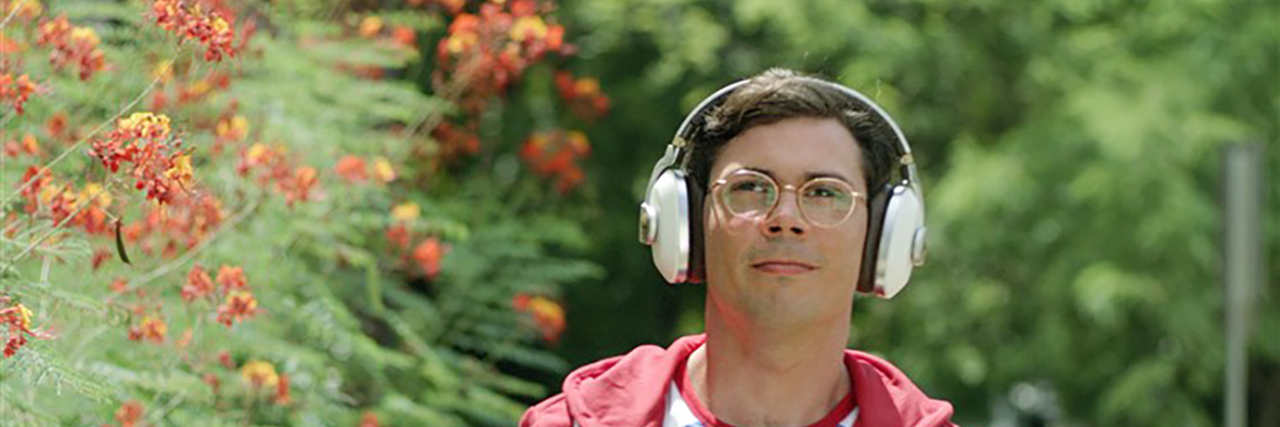Netflix’s 'Special' and Navigating the Space Between Disabled and Able-Bodied
I am a woman in my 40s. I’m cute, sexy, even fit. I’m smart, witty and tenacious. I was a preemie, and I weighed 3 pounds, 7 ounces when I was born, which is the equivalent of a micro-preemie today. My lungs collapsed twice. The doctors told my mom I wouldn’t make it. She named me Angel, because as a non-religious woman she thought there was no way God could refuse a baby named Angel in heaven.
I spent months in the hospital. They told my mom I wouldn’t walk or talk or be a “normal” functioning person. My mom stopped taking me to doctors. My only side effect is a mild case of cerebral palsy. It affects my lower body and gives me an awkward gait. My knees face the wrong direction. My tendons in my heels are too short. I have to concentrate to walk. I stumble a lot when I get tired. I am very choosy about my shoes.
It makes me incredibly insecure. I refused to let anyone video tape my wedding as I can’t bear to see myself walk. I hate looking at photos of myself doing anything remotely athletic— my legs always do something weird.
Today I stumbled upon Ryan O’Connell’s “Special” on Netflix, about a 20-something gay man with cerebral palsy. I binged the whole first season. The first episode seemed to be a direct mirror of my life. The scene depicts an average fall. That opening sequence happens to me on a regular basis. One moment I’m walking along and the next I’m lying on the ground.
I have a laundry list of “interesting” falls: the time I tripped over a piece of lumber buried in grass and broke an ankle, the slip on a bad batch of sidewalk that ended up with five broken teeth, falling down the stairs and ending up deeply purple from my butt down my thigh etc.
Because my mom avoided doctors, I don’t know much about cerebral palsy. I know it manifests differently in every person. I once went to a hospital chief podiatrist, and he could not believe how well I had trained myself to compensate for my issues. He said he could give me inserts for my shoes to fix my gait, but it would ruin my knees. He said he couldn’t do anything more for me and that I shouldn’t be able to walk as well as I do.
This brings me to a resonating scene in the first episode of “Special.” The main character, Ryan Hayes (played by O’Connell) attends physical therapy. “I’m so f*%king jealous of Bob,” Ryan tells his physical therapist, referring to a man in a wheelchair who uses a catheter. The therapist asks why. “It must be freeing to be so disabled,” Ryan answers. He compares having a mild case to being biracial.
I get that. You’re not totally abled, but you’re different, and you don’t really fit in either community. I remember having physical therapy sessions in elementary school with children that had much more intense disabilities than mine. I was too young to understand why I was grouped with them. But when I went to gym class, I couldn’t do what the “normal” kids could do either. My parents never treated me like there was anything “wrong with me.” I’m independent and capable, but disability remains the elephant in the room.
Ryan continues to say that at least when you’re seriously disabled, you know where you belong. That goes a long way.
My husband and I have recently split after more than 20 years. He has a birth defect, a club hand, and was raised in a similar way to me. We never really considered ourselves disabled, yet it was one of our bonds. We never acknowledged the elephant either.
My blind friend Nancy is the one who opened my eyes. We’ve been working together on literary projects for five years now and she keeps pushing me to explore my disability more from a writer’s perspective.
Now that my marriage has ended, I had my first able-bodied lover. He also told me to own my disability. He echoed some of Nancy’s words, and told me that being honest and upfront with people about my CP would do wonders for my confidence.
I don’t have an invisible condition; I know people often stare. I breathe a sigh of relief when a medical professional sees me take a step and knows I have CP and mentions it, just like I’d rather get the conversation out of the way if anyone has a question about my condition.
I have to think about every step I take. “Knees out, pick up your feet, heel to toe, repeat.” Seeing Ryan’s character navigate his identity and the mainstream world made sense to me. What to say, what not to say, how much do people really want to hear? The reactions of his coworkers and friends, especially as he dives deeper into independent living, making real friendships and embarking on sexual relationships certainly seemed genuine to me. The space between disability and able-bodied is incredibly complex to navigate.
Season two comes out in January. I’m looking forward to learning more about Ryan’s journey, and in turn, my own.
Image via Netflix.

